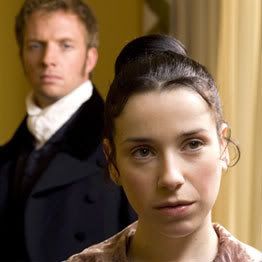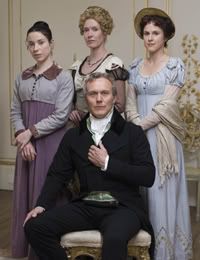
Hello Blog that I have neglected for some time, I’m not going to waste any more time.
In every Jane Austen novel, there has always been the man destined for the heroine. And Captain Frederick Wentworth is such a man. From the previous blogs, the history of Captain Wentworth was briefly mentioned but not to a more detail oriented form. As said previously, Captain Wentworth and Anne Elliot "met and fell in love when she was 19 and he was just a poor captain. However, not long into the engagement, Anne was persuaded (hence the title) by her close friend, Lady Russell, to it break off. They met again 8 years later when he became a wealthy captain and she a woman "passed her bloom". (Blog: Persuading Persuasion) During this time, the captain has not forgiven Anne for breaking his heart 8 years ago. As said, "He had not forgiven Anne Elliot. She had used him ill, deserted and disappointed him; and worse, she had shewn a feebleness of character in doing so, which his own decided, confident temper could not endure. She had given him up to oblige others. It had been the effect of over-persuasion. It had been weakness and timidity." (p. 623) Captain Wentworth resented Anne for giving up on their love so easily, he sailed for 8 years brooding over his rejection. Thus, he returned from the sea with the intent on marrying a woman "worthy" of his affection and had chosen the Louisa Musgrove as his new intended. However, he had no announced his engagement to Ms. Musgrove, his actions towards her depict the intent of marriage. As a result, it was acknowledged that Captain Wentworth would marry Lousia Musgrove, the sister of Charles Musgrove.
Although he cannot claim to be a gentleman by birth, his treatment towards Anne was that of cynical and expressed disgust. Anne’s younger sister Mary Elliot Musgrove had even remarked, `Captain Wentworth is not very gallant by you, Anne, though he was so attentive to me. Henrietta asked him what he thought of you, when they went away, and he said, `You were so altered he should not have known you again.'' (p. 623) This man, who was once enamored by Anne, comments on her faded looks without thought of it being overheard by her. His total disregard for her feelings, in an attempt to mend his wounded pride, only serves to promote Anne as a saint like character. And through all of this, Anne sits with her eyes lowered and accepts the fact that the men she still loves thinks of her as a shriveled husk of her previous self.
However, one cannot completely blame Captain Wentworth to abandon Anne and focus his attentions on Louisa Musgrove. Anne is already 27 years old and is already considered to be on the path of spinster hood. In society today, 27 don’t seem to be an old age to be married but on the contrary, is quite young for it. Unfortunately, society during the 18th century saw females as a means to provide sons and the younger they are, the more likely to produce a healthy heir. In comparison to Anne, Louisa is a lively young being that could provide that and Anne could not. Personally, this reasoning for his future new bride is very vexing. Although, there is understanding for his behavior towards Anne, his disregard for her feelings and the drive to get married to someone younger has left much less to be desired. Unfortunately, this shows how society ignored the plight of females and that something like age can determine the life you may or may not have. To my readers, what is your intake on this? Should Anne wait for a man that shows no respect for her feelings? Is it acceptable for a man to treat any female like a random manifestation found on the sole of his boots?

